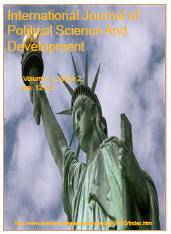| IJPSD |
International
Journal of Political Science and Development |
||||||||||||||||||||||
|
International Journal of Political Science and Development Vol. 2(2), pp. 15 –22, February, 2014 DOI: 10.14662/IJPSD2014.012 ISSN: 2360-784X Review The Troubled Electoral Contestation in Zimbabwe
1Jephias Mapuva and 2Loveness Muyengwa-Mapuva
1Bindura University of Science Education, Department of Geography (Development Students), P.O. Box 1020, Bindura, Zimbabwe. E-mail: mapuva@cooltoad.com 2Midlands State University, Faculty of Law, P.O. Box 9055, Gweru, Zimbabwe
Accepted 24 February 2014
Political events
that have prevailed in Zimbabwe since 1980 have presented challenges
for democracy, giving birth to a chequered electoral history.
Successive electoral contests have produced contested results and
this has been attributed to the defective electoral legislation.
Successive constitutional amendments and the enactment of the
attendant legislation guiding civil society participation in
governance processes have also contributed to the inability of the
voice of the people from being heard. The inheritance of colonial
legislation tended to harden the stance of the leadership. Despite
the fact that the SADC, and the AU, have facilitated the enactment
of guidelines to enable free and fair electoral processes, this has
not been binding on member states, leaving states to conduct
elections under own conditions. In some cases, violence has
characterized elections in Zimbabwe. The new Constitution in
Zimbabwe has not helped improve the way elections have been held, as
well as the authority of the election management body, the ZEC. |
|
|||||||||||||||||||||
